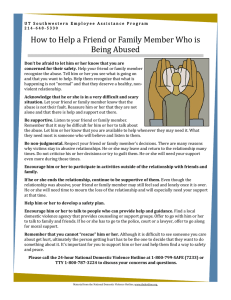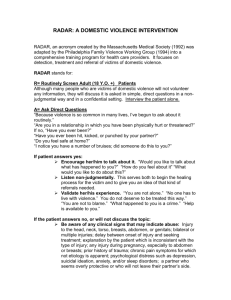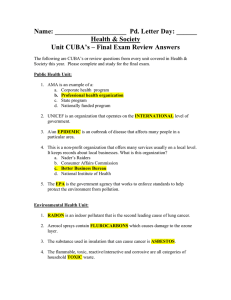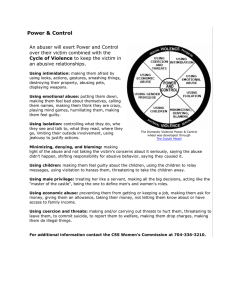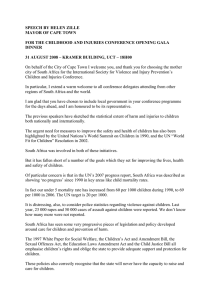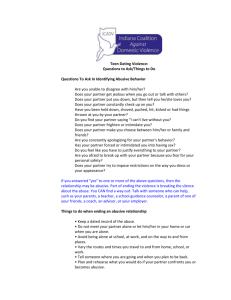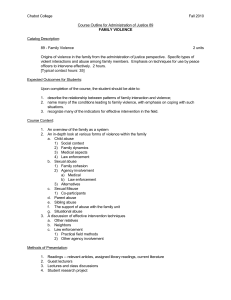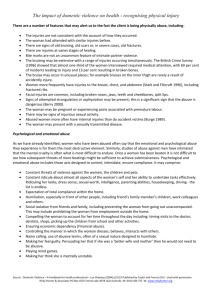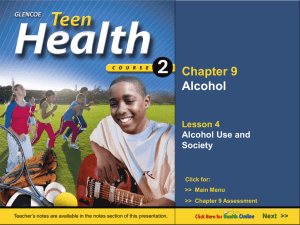radar - Institute for Safe Families
advertisement
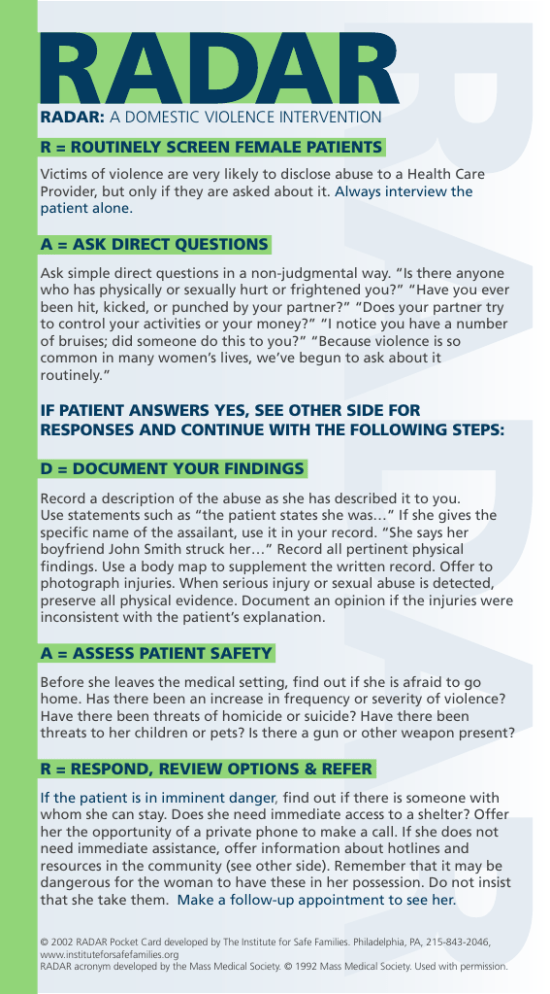
RADAR: A DOMESTIC VIOLENCE INTERVENTION R = ROUTINELY SCREEN FEMALE PATIENTS Victims of violence are very likely to disclose abuse to a Health Care Provider, but only if they are asked about it. Always interview the patient alone. A = ASK DIRECT QUESTIONS Ask simple direct questions in a non-judgmental way. “Is there anyone who has physically or sexually hurt or frightened you?” “Have you ever been hit, kicked, or punched by your partner?” “Does your partner try to control your activities or your money?” “I notice you have a number of bruises; did someone do this to you?” “Because violence is so common in many women’s lives, we’ve begun to ask about it routinely.” IF PATIENT ANSWERS YES, SEE OTHER SIDE FOR RESPONSES AND CONTINUE WITH THE FOLLOWING STEPS: D = DOCUMENT YOUR FINDINGS Record a description of the abuse as she has described it to you. Use statements such as “the patient states she was…” If she gives the specific name of the assailant, use it in your record. “She says her boyfriend John Smith struck her…” Record all pertinent physical findings. Use a body map to supplement the written record. Offer to photograph injuries. When serious injury or sexual abuse is detected, preserve all physical evidence. Document an opinion if the injuries were inconsistent with the patient’s explanation. A = ASSESS PATIENT SAFETY Before she leaves the medical setting, find out if she is afraid to go home. Has there been an increase in frequency or severity of violence? Have there been threats of homicide or suicide? Have there been threats to her children or pets? Is there a gun or other weapon present? R = RESPOND, REVIEW OPTIONS & REFER If the patient is in imminent danger, find out if there is someone with whom she can stay. Does she need immediate access to a shelter? Offer her the opportunity of a private phone to make a call. If she does not need immediate assistance, offer information about hotlines and resources in the community (see other side). Remember that it may be dangerous for the woman to have these in her possession. Do not insist that she take them. Make a follow-up appointment to see her. © 2002 RADAR Pocket Card developed by The Institute for Safe Families. Philadelphia, PA, 215-843-2046, www.instituteforsafefamilies.org RADAR acronym developed by the Mass Medical Society. © 1992 Mass Medical Society. Used with permission. IF THE PATIENT ANSWERS "YES": Encourage her to talk about it. “Would you like to talk about what has happened to you” or “Would you like help?” Listen non-judgmentally. This serves both to begin the healing process for the woman and to give you an idea of what kind of referrals she may need. Validate her experience. “You are not alone.” “You do not deserve to be treated this way.” “You are not to blame.” “What happened to you is a crime.” “Help is available to you.” “The violence is likely to get worse, and I am worried about you.” “If you are not safe, your children may not be safe.” IF THE PATIENT ANSWERS NO, OR WILL NOT DISCUSS THE TOPIC: Be aware of any clinical signs that may indicate abuse: Injury to the head, neck, torso, breasts, abdomen, or genitals; bilateral or multiple injuries; delay between onset of injury and seeking treatment; explanation by the patient which is inconsistent with the type of injury; any injury during pregnancy; prior history of trauma; chronic pain symptoms for which no etiology is apparent; psychological distress such as depression, suicidal ideation, anxiety, sleeping or eating disorders; a partner who seems overly protective or who will not leave the woman’s side; frequent health care visits; substance abuse. If any of these clinical signs are present, ask more specific questions. Make sure she is alone: “I am worried about you. It looks as though someone may have hurt you. Can you tell me how it happened?” “Sometimes when people feel the way you do, it may be because they are being hurt at home. Is this happening to you?” If the patient denies abuse, but you strongly suspect it, document your opinion, and let her know there are resources available to her should she choose to pursue such options in the future. Make a follow-up appointment to see her. RESOURCES 866 . SAFE . 014 (866 . 723 . 3014) Philadelphia Domestic Violence Hotline 215 . 686 . 7082 Women Against Abuse Legal Center 215 . 985 . 3333 Women Organized Against Rape 215 . 242 . 2235 Menergy – For men who are abusive 267 . 625 . 6135 Menergy en Español – For men who are abusive 215 . 564 . 0488 Men’s Resource Center – For men who are abusive 215 . 496 . 0707 Children’s Crisis Treatment Center Trauma focused therapy for children 215 . 438 . 9070 Anti-Violence Partnership Trauma focused therapy for children
